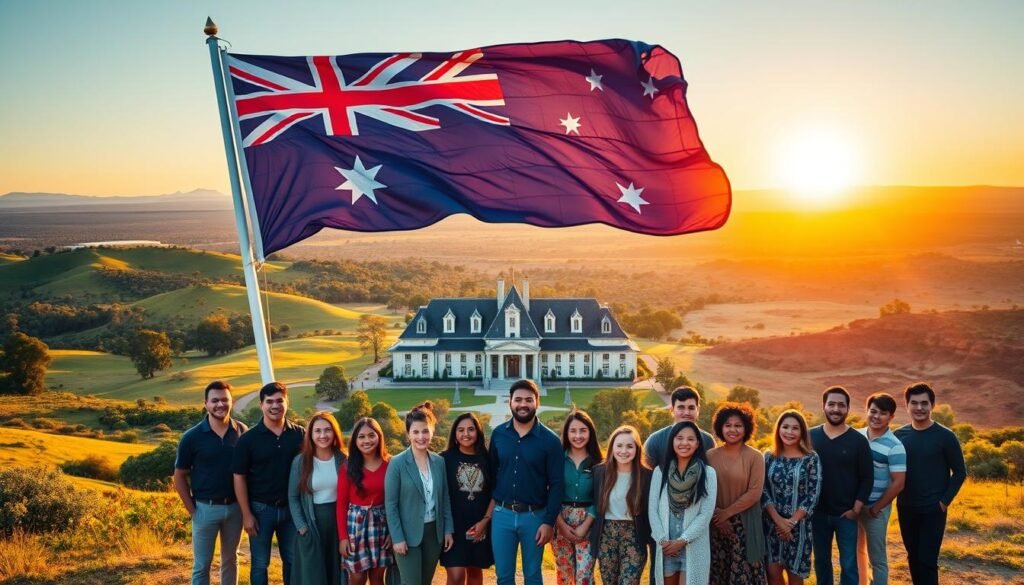
You might feel both excited and overwhelmed as you consider study abroad options. This page is written for you a prospective student who wants clear, practical steps to turn ambition into action.
The australia awards connect your goals with a government-funded program that supports education and development. You will see what the scholarships cover, including tuition, flights and allowances funded by the australian government, so you can judge fit and plan your finances.
You will also learn whether you, as an international students applicant, meet eligibility and timing rules and how to use the DFAT country portal to start your application.
Finally, this introduction previews how the program builds capacity, strengthens links australia, and links you with universities and networks that accelerate your goals.
Why apply for Australia Awards Scholarships today
Applying now sets you on a path to funded study, practical support and enduring professional networks.

What you gain: tuition, travel and living support
You receive comprehensive financial backing full tuition, return airfares, a living expenses contribution and an establishment allowance. This package reduces financial pressure so you can focus on study and practical training.
Wraparound support helps with relocation and wellbeing. You get institutional services, academic guidance and transition help from arrival to completion.
| Funding item | What it covers | Benefit |
|---|---|---|
| Tuition | Full course fees | Cost-free study |
| Travel | Return airfares | Simpler relocation |
| Stipend & setup | Living expenses and allowance | Stable living and focus |
How the awards build knowledge links with Australia
The program is funded by the australian government to create lasting links between institutions and sectors. You will join cohorts designed to develop future leaders who drive positive change.
If you choose a research pathway, secure supervisor support early. That guidance improves your research experience and aligns your courses with national development priorities.
Eligibility criteria and who can apply
Start by confirming the core eligibility rules that determine who may be considered.
You must meet the AAS Policy Handbook requirements. These are the baseline rules all applicants and international students must satisfy. Prepare clear proof of citizenship, academic records and other documents the handbook lists.
Country-level rules add detail. The department foreign affairs publishes profiles that explain extra criteria, age limits, service obligations and document checklists for each country. Use the country profile and application portal to confirm what your nation requires.
Who counts as an international applicant
Check your visa and residency status so it aligns with program definitions. Some study levels or fields have extra conditions linked to development priorities.
| Requirement | What to provide | Why it matters |
|---|---|---|
| Policy Handbook criteria | Certified transcripts, ID, referee details | Determines basic eligibility |
| Country-specific rules | Local documents, service statements, age proof | Ensures you meet national priorities |
| Selection factors | CV, motivation, English tests | Used to choose recipients on merit and impact |

Key dates and timelines you should plan around
Knowing the schedule makes the application manageable. You should map tasks to your country’s cycle because close dates vary between countries. A recent example closed on 30 April 2024, showing why local calendars matter.
Where to check official dates
- Refer to the department foreign affairs country profile and application portal for your official timeline.
- Monitor updates from foreign affairs trade and your local country office for mid-cycle notices.
Typical annual cycles and country variations
Cycles usually follow an annual rhythm: portal opening, submission window, assessment, and awards. Each country sets different submission and interview windows, so align your steps to that schedule.
Example past close date: 30 April 2024
Use past dates as a planning guide. Work backward from the closing date to book language tests, collect references and confirm supervisors for research pathways.
When you’ll hear outcomes from your Australia Awards office
Assessment can take several months. Successful applicants are notified by their Australia Awards office. Allow extra time for visa processing, university admissions and document checks to protect your candidate experience.
| Milestone | Typical timing | Action you should take |
|---|---|---|
| Portal opening | Several months before close | Prepare documents and set reminders |
| Application close | Country-specific (example: 30 April 2024) | Submit complete, certified files |
| Assessment & interviews | Weeks to months | Monitor emails and respond promptly |
| Award notification | Months after close | Accept offer, start visa and enrolment steps |
How to apply through DFAT and university partners
Begin at the Department of Foreign Affairs and Trade country page to access the official portal and local instructions. This page is the single entry point for your application and for confirming any national variations that affect your submission.
Prepare your documents to match the AAS Policy Handbook and align your course choices with development priorities. If you plan research studies, contact potential supervisors early and secure written support before you submit.
Find your country profile and access the application portal
Use the department foreign affairs country profile to open the portal. Follow the country checklist and upload certified files in the required format.
Securing academic supervision for research degrees
Research applicants must show supervisor support. Reach out to potential supervisors, share a concise research summary and get confirmation in writing. Keep that letter with your other documents for upload.
What happens after you’re nominated by your Australia Awards office
Successful applicants are notified by their local office. Recipients normally have the office submit institutional paperwork on their behalf.
Keep all correspondence, supervisor letters and portal confirmations to speed up follow-up steps.
| Step | What you do | Outcome |
|---|---|---|
| Start on DFAT country page | Open portal, read country guidance | Access official application |
| Prepare documents | Follow AAS Policy Handbook | Complete, correctly formatted files |
| Research supervision | Obtain written support from supervisor | Meets research degree requirement |
| Post-nomination | Review offer and accept | Student Contact Officer assigned |
Priority areas, eligible courses and research degrees
Prioritise courses that translate into practical skills for public health, governance and infrastructure delivery.
Targeted priority areas link your studies to tangible development outcomes like health security, good governance and economic recovery.
Choose from a wide set of coursework options that build sector leadership and technical skills. Examples include Master of Public Policy, Master of Global Health and Master of Public Health to strengthen policy and system design.
For economic and organisational reform choose options such as Master of Commerce, Master of Management or business law pathways. For technical fields look at civil engineering and project management or urban regional planning to support infrastructure planning.
Coursework aligned to health security and public policy
Courses such as Master of Health Policy, Master of International Relations and Master of Health Communications help you shape policy and lead programs.
Short applied programs like the DFAT-supported Water Utility Regulatory Approaches teach tariff design, performance monitoring and site-based learning so you can implement reforms.
Research pathways: Masters by Research and Doctor of Philosophy
Research degrees let you generate evidence for policy and practice. Eligible options include Master of Education (Research), Master of Arts (Research), MPhil and Doctor of Philosophy across social science, business and medicine and health.
If you aim for a Doctor of Philosophy, plan a clear research proposal and secure supervisor support early. Masters by Research and MPhil routes also build rigorous methods and sector connections.
| Priority area | Typical coursework | Research options |
|---|---|---|
| Health security | Master of Public Health, Master of Global Health, digital health | Master of Medical Research, Doctor of Philosophy (Medicine and Health) |
| Governance & policy | Master of Public Policy, Master of International Relations, Master of Administrative Law and Policy | Master of Arts (Research), MPhil (Arts and Social Sciences) |
| Infrastructure & planning | Civil engineering, project management, urban regional planning | Doctor of Philosophy (Engineering) |
| Economic capability | Master of Commerce, Master of Management, business law | MPhil (Business), Doctor of Philosophy (Business) |
Map your chosen courses and research to national priorities and show how your studies will deliver measurable results.
On-award support for scholarship recipients
From landing to graduation, a dedicated team guides your daily needs and academic progress.
Your Student Contact Officer: arrival to completion
Your Student Contact Officer (SCO) is the first contact after acceptance. They provide a welcome pack and organise airport pickup and temporary accommodation so your first days are calm and predictable.
The SCO helps set up a bank account and points you to local services. You get clear instructions about forms, timelines and who to contact for each issue.
Academic, family and travel assistance while you study
You receive practical and wellbeing support throughout your award. Academic referrals, research guidance and timely advice keep your study on track.
- Practical arrival services: welcome pack, airport transfer, temporary housing.
- Administrative help: bank setup, local services and compliance guidance.
- Academic support: coursework help, supervisor liaison and specialist referrals.
- Family support: wellbeing resources and tailored advice for your family life.
- Travel and final steps: approved travel arrangements, a return home briefing and a completion ceremony for scholarship recipients.
«Clear communication and a single point of contact make your study life simpler and more productive.»
Ready to take the next step toward your award
Take the next step by opening your DFAT country profile and checking the portal timeline for your nation.
Start now, confirm eligibility and key dates on the department foreign affairs page so your application is complete and on time.
Refine a concise study plan that links your skills to development outcomes. Show how your studies whether in social science, civil engineering, digital health, urban regional planning or project managementwill contribute development and strengthen links australia.
Prepare evidence of leadership, supervisor support for research or doctor philosophy pathways, and the benefits you expect. Note that tuition, return airfares and a living expenses contribution support your study focus.
Keep documents consistent, follow foreign affairs trade guidance and work closely with your Australia Awards office and australian department contacts to move from application to outcome.